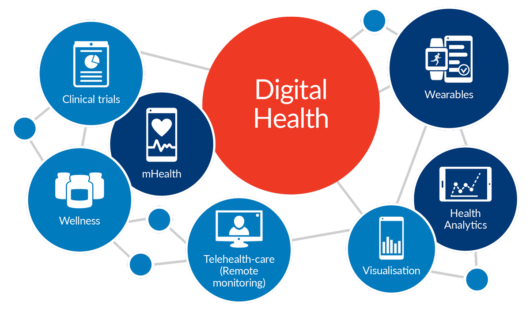What are Digital Health Interventions?

Digital health interventions refer to the use of digital technologies, such as mobile devices, computers, and wearable sensors, to promote health, prevent disease, and manage chronic conditions. These interventions can take various forms, including mobile apps, online platforms, virtual reality experiences, and telehealth services. The primary goal of digital health interventions is to empower individuals to take control of their health, improve health outcomes, and enhance the overall quality of care.
Types of Digital Health Interventions
Digital health interventions can be broadly categorized into several types, including:
- Telehealth: Telehealth involves the use of digital technologies to deliver healthcare services remotely, including video consultations, phone calls, and messaging.
- Mobile Health (mHealth): mHealth refers to the use of mobile devices, such as smartphones and tablets, to promote health and wellness.
- Health Informatics: Health informatics involves the use of digital technologies to collect, store, and analyze health data, with the aim of improving health outcomes and streamlining clinical workflows.
- Personalized Medicine: Personalized medicine involves the use of digital technologies to tailor healthcare services to individual patients, taking into account their unique genetic profiles, medical histories, and lifestyle factors.
- Artificial Intelligence (AI): AI-powered digital health interventions use machine learning algorithms to analyze health data, identify patterns, and make predictions, with the aim of improving health outcomes and reducing healthcare costs.
Benefits of Digital Health Interventions
Digital health interventions offer a wide range of benefits, including:
- Improved Access to Care: Digital health interventions can increase access to healthcare services, particularly for underserved populations, such as rural communities and individuals with disabilities.
- Enhanced Patient Engagement: Digital health interventions can empower patients to take a more active role in their healthcare, improving health outcomes and reducing healthcare costs.
- Personalized Care: Digital health interventions can provide personalized care, tailored to individual patients’ needs, preferences, and lifestyle factors.
- Increased Efficiency: Digital health interventions can streamline clinical workflows, reducing administrative burdens and improving the overall efficiency of healthcare services.
- Cost Savings: Digital health interventions can reduce healthcare costs, by minimizing the need for hospitalizations, reducing readmissions, and improving health outcomes.
Impact of Digital Health Interventions on Healthcare
The impact of digital health interventions on healthcare has been significant, with far-reaching consequences for patients, healthcare providers, and payers. Some of the key impacts include:
- Improved Health Outcomes: Digital health interventions have been shown to improve health outcomes, particularly for chronic conditions, such as diabetes, heart disease, and asthma.
- Reduced Healthcare Costs: Digital health interventions have been shown to reduce healthcare costs, by minimizing hospitalizations, reducing readmissions, and improving health outcomes.
- Enhanced Patient Satisfaction: Digital health interventions have been shown to improve patient satisfaction, by providing personalized care, increasing access to care, and enhancing patient engagement.
- Increased Efficiency: Digital health interventions have been shown to increase efficiency, by streamlining clinical workflows, reducing administrative burdens, and improving the overall quality of care.
Challenges and Limitations of Digital Health Interventions
While digital health interventions offer a wide range of benefits, there are also several challenges and limitations that need to be addressed. Some of the key challenges include:
- Regulatory Frameworks: The regulatory framework for digital health interventions is still evolving, with a need for clearer guidelines and standards.
- Data Security: Digital health interventions require the collection, storage, and analysis of sensitive health data, which raises concerns about data security and privacy.
- Interoperability: Digital health interventions often require the integration of different systems and technologies, which can be challenging, particularly in terms of interoperability.
- Digital Divide: The digital divide, which refers to the unequal access to digital technologies, can limit the reach and effectiveness of digital health interventions.
FAQs
- What is the definition of digital health interventions?
Digital health interventions refer to the use of digital technologies to promote health, prevent disease, and manage chronic conditions. - What are the types of digital health interventions?
The types of digital health interventions include telehealth, mobile health, health informatics, personalized medicine, and artificial intelligence-powered interventions. - What are the benefits of digital health interventions?
The benefits of digital health interventions include improved access to care, enhanced patient engagement, personalized care, increased efficiency, and cost savings. - What is the impact of digital health interventions on healthcare?
The impact of digital health interventions on healthcare includes improved health outcomes, reduced healthcare costs, enhanced patient satisfaction, and increased efficiency. - What are the challenges and limitations of digital health interventions?
The challenges and limitations of digital health interventions include regulatory frameworks, data security, interoperability, and the digital divide.
Conclusion
Digital health interventions have revolutionized the healthcare industry, offering a wide range of benefits that cater to the diverse needs of patients, healthcare providers, and payers. While there are several challenges and limitations that need to be addressed, the potential of digital health interventions to improve health outcomes, reduce healthcare costs, and enhance patient satisfaction is vast. As the healthcare industry continues to evolve, it is likely that digital health interventions will play an increasingly important role in shaping the future of healthcare. By understanding the definition, types, benefits, and impact of digital health interventions, we can harness their potential to create a more efficient, effective, and patient-centered healthcare system.
Closure
Thus, we hope this article has provided valuable insights into Digital health interventions. We appreciate your attention to our article. See you in our next article!